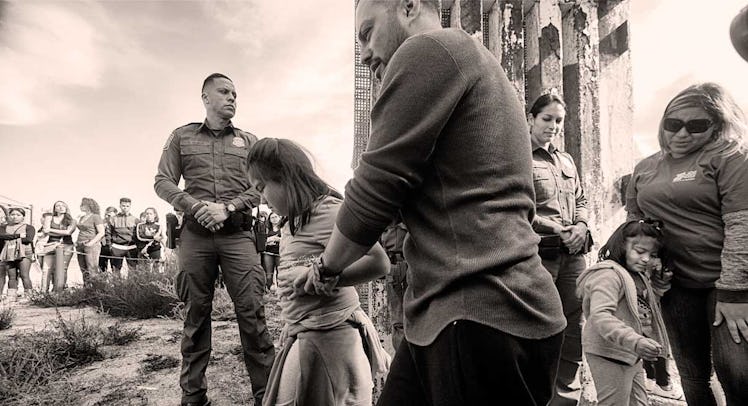How Can You Not Sympathize With Asylum Seeking Parents?
Whether they are allowed into America is a debate. That they have selflessly sought to help and protect their children is not.

After a highly televised, month-long journey, a caravan of asylum seekers from Central America have arrived at the San Ysidro side of the Mexican-American border, just a fence away from their intended destination. These migrants have come as families and arrived with their hopes bundled together. They look like me, my wife, and my two kids at the end of a long hike — except they don’t get to go home. It’s unclear where they’ll end up and, more distressingly, whether they’ll end up together.
There has been a great deal of attention focused on the dozens of immigrants in the caravan, who have fled the violence and poverty of their home countries. Those that would keep them out of the United States claim they represent an unwanted burden. Those that would let them in suggest that our country has a moral obligation to welcome the seekers. But I can’t help but focus on the parents themselves. I can’t help but think about the choice that they’ll likely end up facing and what I would do if I had to stand in their well-worn shoes.
These parents aren’t dumb; they’re aware of the Trump administration’s hostility towards Central American and Mexican migrants. They understand that they will be welcome not with open arms but with closed gates. Should they attempt to cross under the cover of darkness, it’s very likely they will be caught and separated from their children because that’s now the deterrent — a particularly mean-spirited and cruel one at that.
There is nothing more disturbing to me than the thought of being separated from my kids. In fact, I can bring myself to the edge of a teary panic by simply imagining them alone without me and their mom. They’re young. They need me. The thought of their frightened faces makes my chest tighten. What could possibly make me willingly place them in a situation where we were in danger of losing each other, even temporarily? Well, that’s where this thing gets horrific.
Murder. Rape. Disease. Death. My question might sound rhetorical, but there are concrete answers — none of them good.
If the risk of my family’s death from hunger or violence were greater than the dangers of travel, I’d like to think I would do what the parents south of the border wall have done. I’d like to think I wouldn’t wait and see or try to make my country a better place. I’d like to think I would leave that to other people and take care of my kids. Why? It’s the moral choice. The risk — the horror of separation — is nothing compared to permanent loss. Look up what happens to young girls in El Salvador. Tell me you wouldn’t come over the wall.
North of the border we’ve forgotten our own mass migrations. We’ve forgotten the ragged caravans that made their way out of the dust bowl. We’ve forgotten how blacks fled the Jim Crow south for Chicago and New York. We’ve forgotten that petty crimes in those cities drove white people to the suburbs. We’ve even forgotten that the hint of opportunity in those same cities drove white people back to begin the long project of gentrification.
ALSO: The Definitive Glossary Of Parenting Styles, From Attachment To Wolf
Parents move to save or help their kids. It’s fundamental. No immigration policy is going to change that or deter them from doing so. Immigration policies can, and recently have, slowed the flow of migrants. But they won’t turn around parents who want to save their kids more than they want to save themselves the pain of potentially parting with their kids. Harsh policies only compound the pain.
So as I see the faces of parents at the at the San Ysidro port of entry, I think about myself and my boys and what I would or wouldn’t do for them to have a better life. If it were me, I’d throw open the gates. And I don’t say that because I believe it to be a smart immigration policy. I say it because I don’t really care. I want kids to be safe. Parents get sentimental like that. I can’t think about policy and look at my boys. I haven’t the heart for it.
This article was originally published on